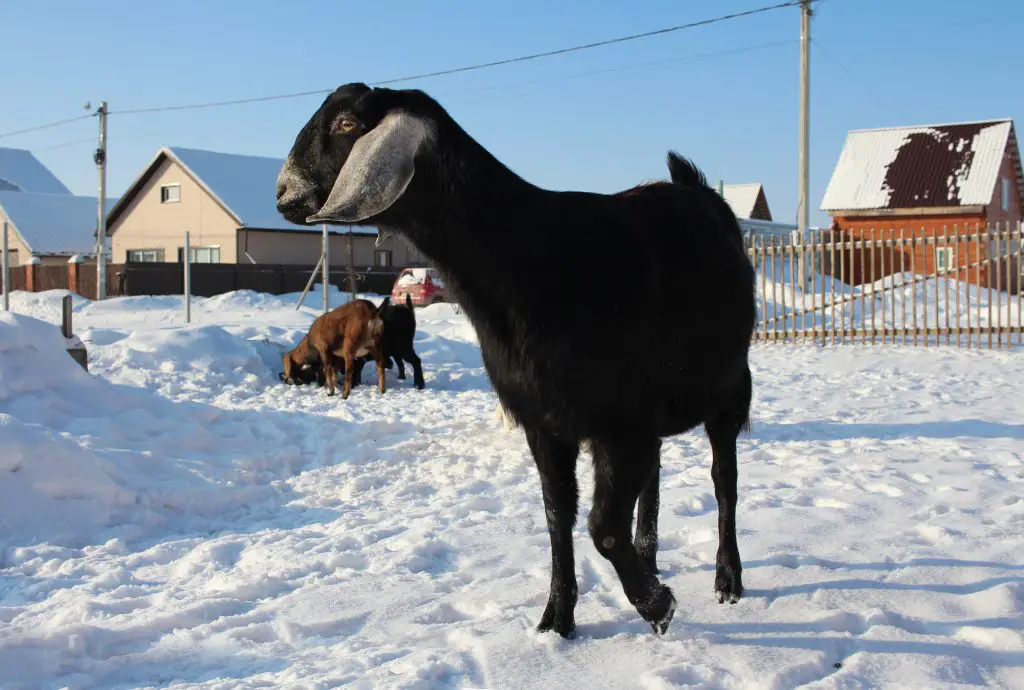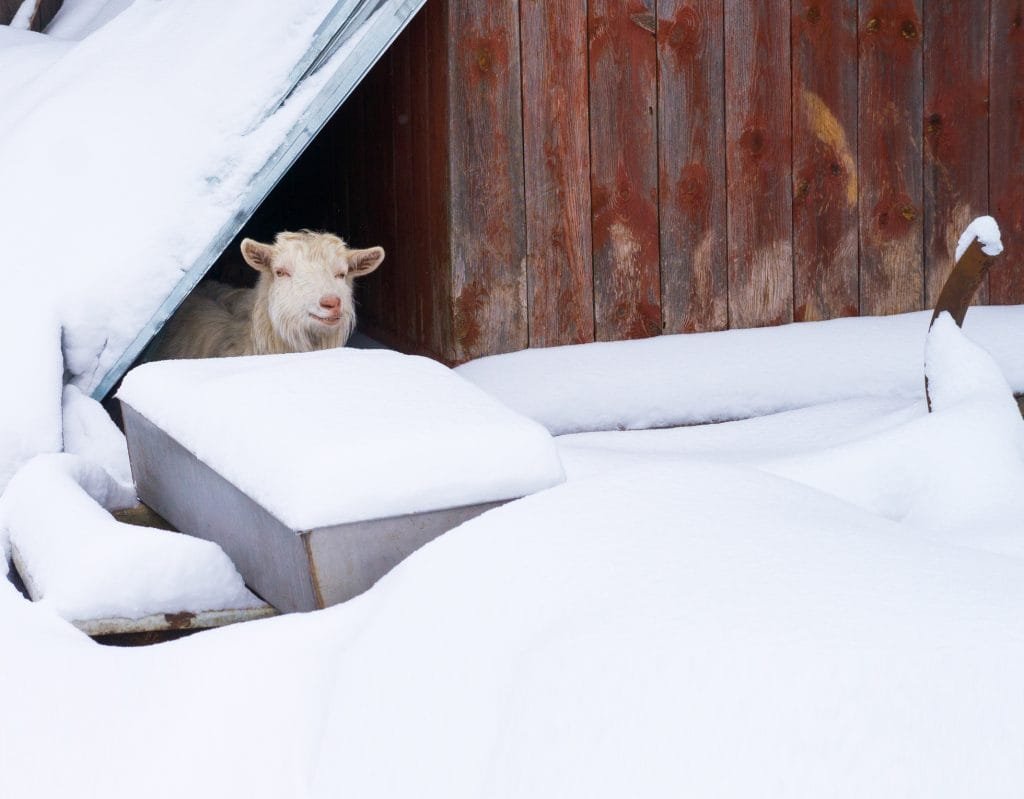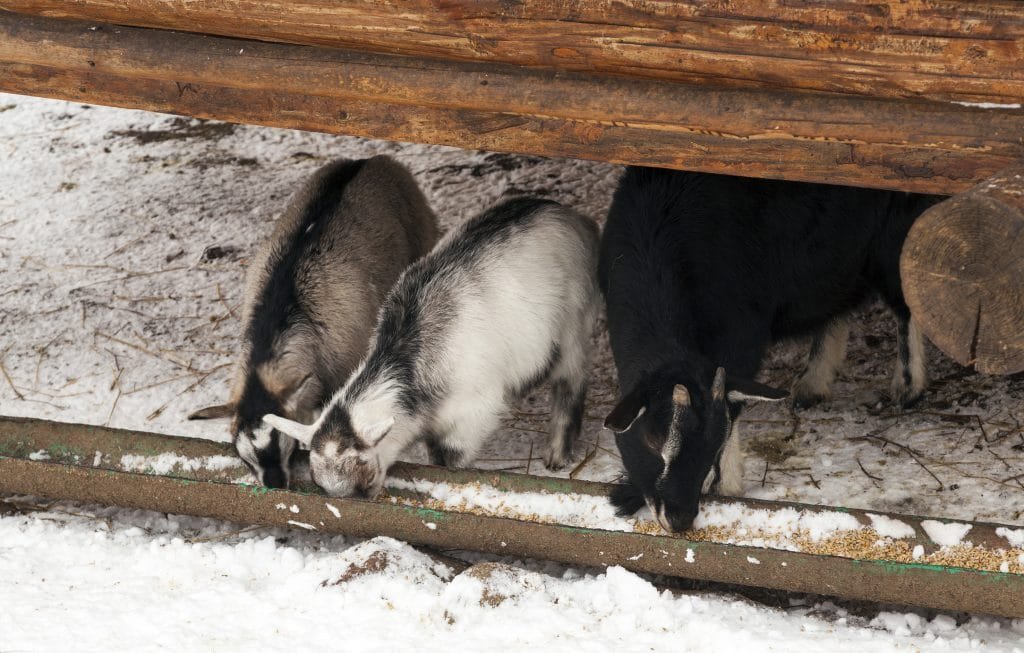This post contains affiliate links.
Goats are hardy low maintenance animals. But many goat owners are concerned about their goats when temperatures drop in the winter. Winter weather can be hard on livestock but do goats need heat in the winter?
Most healthy goats do not need heat in winter. They need to be kept out of the wind, rain, cold, and snow to stay healthy and prevent hypothermia. Pregnant does, kids and sick goats may need extra heat during the winter. Certain goats have an extra layer of hair to help them regulate their body temperature.
When caring for goats in the winter it’s key to know about their needs. It’s important to know how they regulate their temperature during the cold winter months and what you can do to keep them comfortable, dry and safe.

Factors That Influence Temperature Needs Of Goats In The Winter
If you happen to live in an area with extremely cold winter months, there are certain factors to remember before deciding if your goats will need added heat in the winter.
Most Goats Regulate Their Body Temperature
Goats are sturdy animals that have developed survival instincts and traits over hundreds of years. One of the key advantages goats have is that their body can regulate their temperature. While goats prefer temperatures of between 54-75° Fahrenheit, they can easily handle freezing temperatures.
Many goat farmers have had no issues with their fully grown, healthy goats in temperatures as low as -30 deg F (-34 deg C). There are some steps you need to take to get them through these low temperatures such as extra bedding and more food, more on this later.
Goats have a normal temperature of between 101.5° F and 104° F. Their bodies use a metabolic response that, in turn, causes a homeothermic response. A homeothermic response means a goat’s internal temperature will remain within its normal range regardless of the external environment.
Most goats have the ability to regulate their temperature, but there are exceptions to this rule. Does that are pregnant and kids are much more susceptible to the cold. In winter, you will need to ensure there is a solid shelter with sleeping areas that are not directly on the ground and dry bedding.
You can install a heating system or a heating lamp in the labor pens in extreme conditions. Keep in mind that goats tend to chew on exposed electrical wires, and barn fires are a problem if your heat lamp has issues or the wires.
Goats That Need To Acclimate
If you have goats that have never been in extreme cold, they need to acclimate to the cold. Over time, herders and farmers have learned that goats from warmer climates can acclimate to colder weather.
Their bodies will start to grow a thicker layer of fiber, and they might shiver slightly, but in no time, they will acclimate and become used to the colder temperatures. You shouldn’t give these goats the extra warmth like a heat lamp unless they are kids or pregnant does.
It might seem cruel not to give a goat still acclimating extra warmth, but for the goat to properly acclimate, it needs to experience the cold so its body will respond and grow the thicker layer of fiber it needs to stay warm.
Some goat farmers use artificial coats for goats that don’t usually tolerate the cold or goats that are ill, but it all depends on if you have a breed that can’t stand the cold like Nubians.
The Goats’ Nutritional Needs
To grow a good winter coat and keep warm in the winter, goats need the right nutritional combination. For the goats to keep their body temperature regulated, they need to eat more often and need the extra fiber in hay suitable for goats. The fiber provides a constant source of rumination (the process of partially digesting food and regurgitating it). For pregnant does and kids, the hay might not be enough.
Pregnant does, and kids that are still developing can go into ketosis, and in cold weather, this can prove fatal. Ketosis is a life-threatening condition where the body of a goat is unable to consume enough calories. It will weaken the goat to the point where its body will crash, and hypothermia will set in.
Water is also essential in keeping the goats healthy during cold weather and rumination. Goats won’t eat without drinking water, so ensuring a constant supply of freshwater is a must. A heated water bowl is an easy way to provide drinking water in cold weather.
- NAMSAN focus on researching pet supplies, this Heated Water Bowl is authorized by Namsan,...
- Cats, dogs, or most animals drink room temperature water at around 25 ℃(77°F). Just...
- 1.65 M (5.5 feet) power line, steel wrapped, chew-resistant, safety for pets water...
The most important thing to remember regarding the nutritional needs of goats in the winter is that they should have a balanced diet of hay and other foods to keep them in optimal health.
Goats that only have hay during winter months show deficiencies in fat-soluble vitamins. In areas like Alaska, where the cold temperatures are extreme, the goat farmers provide their goats with vitamin A, D, and E injections to keep them healthy.
The Goats’ Shelter Needs
Most goat shelters don’t need to be elaborate, but they should provide the goats with shelter out of direct rain, wind, and snow. Goat farmers have movable or solid goat shelters that keep the goats out of the cold, like three-sided shelters or dedicated barns. Wind and wetness are the main issues that will leave goats vulnerable to cold temperatures.
Wind chill evaporates the moisture in the air and can lead to dehydration. Wetness seeps into the thick layer of extra fiber that the goats grow in winter to accommodate the cold. The wetness gets trapped between the body and the thick fiber layer leaving the goats vulnerable to the cold.
The goats need to have cover and shelter to escape the adverse weather conditions, but they shouldn’t be too confined. The shelter should have at least two doors for entry and exit options to prevent the goats from getting trapped and trampling each other. Learn more about what sort of shelters goats need in my article, What Kind Of Shelter Do Goats Need?

The Shelter Temperature
The other factor that impacts the shelter needs of goats during the winter months is the temperature on the inside of the shelter. It shouldn’t be much warmer in the shelter than the temperature outside the shelter.
Exposure to the extreme temperature swings they will encounter when going in and out of the shelter can lead to sickness. Remember to replace the bedding for your goats regularly. Goats need dry bedding to help them stay warm, and as soon as bedding is moist, you should throw it out.
The ideal shelter for keeping goats dry, warm, and out of the elements is a shelter with two doors, good ventilation, separated pens for pregnant does and developing kids with dedicated sleeping areas that are off of the ground with dry bedding and extra food to help keep their metabolism healthy.
The Needs Of Pregnant Does And Developing Kids in Winter
The needs of pregnant does and developing kids during the cold months of the year are different than that of normal goats. Most goat farmers choose to bottle feed the kids after they are born to give the doe time to recover in the colder months.
During the winter months, pregnancy, cold, and birth can take a toll on the doe and can lead to health complications. That’s why it’s preferred not to add to the doe’s recovering body through the feeding needs of the kid.
So much can go wrong with kidding in the winter months, most goat breeders and farmers are adamant about not kidding in cold months. They take preventative measures to ensure that their does won’t get pregnant during these months. They separate the bucks and does from each other.
It keeps the female goats safer during winter months since they don’t have the vulnerability to cold weather as pregnant does and growing kids have. The breeders and farmers feel strongly about thoroughly planning kidding season so it won’t fall in cold months and developing kids have enough time to adapt to the colder weather.
Goats also need assistance when in labor. Goats delivering a single kid will be ok giving birth on her own, but she will need assistance if there are multiple kids. It can be life-threatening to the doe and the kids if a goat is left to give birth to multiple kids without assistance.
Newborns and developing kids will need extra warmth and shelter during the winter months because they cannot regulate their body temperature like mature goats. They will need the extra warmth and shelter while their bodies grow and start to regulate their temperature.
Key Factors To Look For When Your Goats Are Too Cold
If you have new unacclimated goats or an unexpected sudden drop in temperature, there might be goats that won’t adapt quickly enough before they become sick, like freshly shorn goats. Here are a few signs that you can look for when inspecting your goats for cold stress during winter:
- If there is an unexpected drop in temperatures, watch closely for shivering. If you see the goats shiver, but their bodies have successfully acclimated, you might need to take measures to keep them warmer.
- If your goats are huddling together to stay warm, then you need to increase the warmth in their shelter as they might go into cold stress.
- Grinding their teeth is also a sign that they are too cold and need added heat to regulate their body temperature.
- They eat more feed but don’t walk outside in the pasture lands. They might be going into cold stress and need to get warm as soon as possible.

Tips To Keep Goats Healthy During Winter
While goats are strong animals and will do fine during the winter months, here are a few tips to make it easier to survive the winter with minimal heat requirements during cold months.
Provide More Feed and Hay to Goats in Winter
During cold weather, it’s important to provide more hay and feed for your goats. This is because the act of digestion actually helps to keep goats warm. This is especially true when goats eat food high in fiber like hay.
Goats are ruminants just like cows they have four stomachs. The process of digesting and regurgitating their food helps provide their bodies with the energy needed to maintain their body temperature.
Add Extra Bedding
Extra bed helps keep goats warm at night. Adding pine shavings under the straw bedding will help absorb moisture and urine which stops your goats from getting wet. Changing the bedding frequently gives your goats a clean and dry place to escape from the cold.
Plan Kidding Season
As stated before, developing kids and pregnant does have a tough time during winter, so try to plan the kidding season to occur in the warmer months. It will ensure that the newborn kids and pregnant or lactating does don’t get cold stress.
Try To Avoid Obesity
Keep an eye on the goats when it comes to feeding. If you see a goat gaining too much weight too fast, it might lead to obesity. Obesity in goats is a serious health concern, and you should cut back on the amount of feed until the goat is at a healthy weight.
Don’t Worry Too Much About Acclimating Goats
If you have acclimating goats, don’t worry if you see them shiver slightly. It’s their body’s normal way of getting used to the colder weather and allows the thick fiber layer to grow quicker. If they have other cold stress symptoms, then you should act.
Proper Placement Of Water Troughs
Keep the watering troughs of the goats away from the sleeping area as the water will cause cold to accumulate and might also freeze. That’s why regularly checking to ensure the water is fresh and drinkable will aid in the health of your goats.
Lice Are A Problem In Winter For Goats
Lice are a major concern during winter months for your goats, and because you shouldn’t shear your goats during winter months, you need to keep a close eye on your goats. Serious lice infestations could severely affect your goats’ health.
A bad lice infestation can lead to anemia, poor skin condition, and poor fiber growth. It could lead to your goats not having a healthy coat in winter, and they could become ill. The best you can do for your goat is to visit your vet and develop a treatment plan should this become a problem.
Provide Heat Only When Necessary
If you have a sick goat, pregnant doe, or newborn kid, you should add extra heat to their shelter. Goats that have a medical reason why they can’t regulate their body temperature are the only ones who need extra heat during winter. Remember to be careful, though, as heating lamps may lead to fires.
Final Thoughts
The needs of goats in the winter vary in breed, but several other factors also play a role in whether goats need heat during the colder months. These factors include pregnant does or developing kids, acclimating goats, nutritional and shelter options.
In the end, not all goats need added heat in the winter months, but there are exceptions. As long as they have sufficient shelter, food, water, and dry bedding during cold temperatures, they will be healthy and safe in the winter months.

